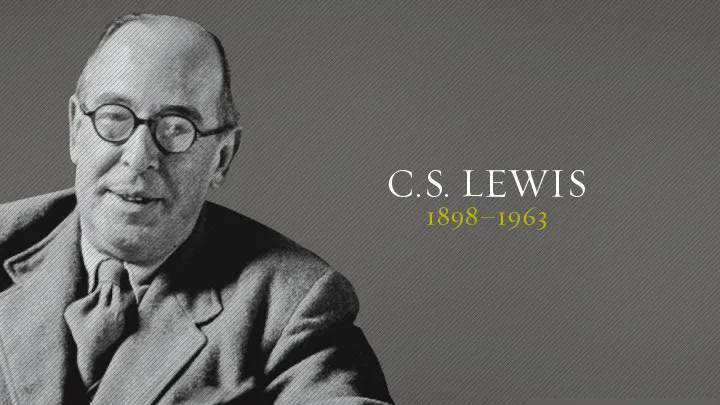The Lasting Legacy of C.S. Lewis: A Cultural Impact Analysis

Introduction to C.S. Lewis
C.S. Lewis, an eminent literary figure of the 20th century, is widely recognized for his profound contributions to literature, theology, and philosophy. Born on November 29, 1898, in Belfast, Ireland, Lewis exhibited an early passion for storytelling and literature. He pursued his academic interests at Exeter College, Oxford, where he earned a scholarship in 1917. Over the years, his writings transcended mere storytelling, engaging readers in deep philosophical and theological inquiries.
Lewis’s most significant works include ‘Mere Christianity’ and ‘The Chronicles of Narnia.’ In ‘Mere Christianity’, which originated as a series of radio talks during World War II, he articulates theological concepts in a manner accessible to both believers and skeptics. His exploration of morality, virtue, and the essence of Christian faith has influenced countless readers and thinkers, making the book a cornerstone in Christian apologetics. Lewis sought to provide a logical foundation for faith, navigating complex ideas with clarity and depth.
‘The Chronicles of Narnia’, a series of seven fantasy novels, showcases Lewis’s creative genius and illustrates his ability to weave profound moral lessons into engaging narratives. The series, starting with ‘The Lion, the Witch and the Wardrobe,’ not only appeals to children but has remained a staple in adult literature as well. Themes of sacrifice, redemption, and the battle between good and evil resonate throughout the tales, with allegorical references that reflect Lewis’s Christian convictions.
Throughout his career, Lewis remained dedicated to blending storytelling with philosophical inquiry, reflecting his belief in the transformative power of literature. His works remain timeless, encouraging readers to explore the intersections of faith, reason, and imagination. C.S. Lewis’s lasting legacy continues to inspire new generations to delve into the depths of human experience through both fiction and theology.
Mere Christianity: A Timeless Exploration of Faith
“Mere Christianity,” published in 1952, is one of C.S. Lewis’s most influential works, offering a profound exploration of Christian faith. Originating from a series of radio broadcasts during World War II, Lewis sought to present a rational foundation for belief in Christianity amid the tumultuous backdrop of society’s uncertainty. This seminal work distills essential Christian teachings into their most fundamental elements, making it accessible to both believers and skeptics alike. Lewis’s aim was not to support any particular denomination but rather to articulate what he regarded as the core tenets of Christian doctrine.
Central to “Mere Christianity” are themes of morality, free will, and the nature of God. Lewis argues that the existence of a universal moral law points to a higher source, suggesting that morality is not a construct of society but inherently woven into the fabric of human existence. He articulates that the struggle between good and evil within individuals reflects the ongoing battle of choices shaped by free will. Lewis elucidates the nature of God’s love, positing that divine sacrifice is a testament to this love and a blueprint for understanding selfless human love.
The relevance of “Mere Christianity” endures in contemporary discussions of faith and morality. In an age marked by skepticism and pluralism, Lewis’s logical reasoning and approachable storytelling provide a bridge for those grappling with spiritual questions. His work invites deep reflection on the moral implications of belief, making the complex concepts of theology not only comprehensible but also applicable to everyday life. Thus, the timeless exploration of faith in “Mere Christianity” continues to inspire thoughtful dialogue, encouraging individuals to ponder the essence of their beliefs in the quest for meaning and purpose.
The Chronicles of Narnia: Imagination and Allegory
‘The Chronicles of Narnia’ is a beloved series of seven fantasy novels penned by C.S. Lewis, first published between 1950 and 1956. Set in the fictional realm of Narnia, these stories revolve around the adventures of children who stumble into this magical world, serving as pivotal figures in its epic battles between good and evil. The plot intricately weaves a variety of moral lessons and theological themes, creating a rich tapestry that captures the imagination of readers of all ages.
The protagonists, such as Peter, Susan, Edmund, and Lucy Pevensie, navigate through Narnia facing formidable enemies, like the White Witch, and embracing powerful allies, including the noble lion Aslan. The characters are often seen as representations of various human virtues and vices, featuring distinct allegorical elements that allow readers to explore complex philosophical and theological concepts. For instance, Aslan is frequently interpreted as a Christ-like figure, embodying the themes of sacrifice, redemption, and resurrection, which resonate deeply within the Christian tradition.
Through the use of vivid imagery and enchanting narratives, Lewis effectively engages young readers while simultaneously conveying profound moral teachings. The blending of fantasy and reality in ‘The Chronicles of Narnia’ serves to both entertain and educate, prompting readers to reflect on philosophical dilemmas and ethical questions applicable to their own lives. This dual appeal has significantly contributed to the series’ enduring popularity and cultural significance.
As a timeless piece of literature, ‘The Chronicles of Narnia’ continues to inspire new generations. Its imaginative storytelling, coupled with rich allegorical depth, ensures that the series remains a vital component of children’s literature while appealing to adult audiences as well. In navigating the realms of fantasy and morality, Lewis has crafted a cultural touchstone that invites readers to explore the depths of their own convictions, assuring its legacy as a meaningful contribution to literary history.
Cultural Resurgence: The Impact of Film Adaptations
The film adaptations of C.S. Lewis’s works, particularly the acclaimed Narnia series, have significantly contributed to a cultural resurgence surrounding his literature. Since the release of the first adaptation, “The Lion, the Witch and the Wardrobe,” in 2005, the films have rekindled interest in Lewis’s narratives, offering a fresh lens through which contemporary audiences can engage with timeless themes such as bravery, sacrifice, and moral choices. This renewed engagement has not only revitalized the allure of Lewis’s original texts but also introduced complex philosophical ideas embedded within his work to a younger audience.
The commercial success of these adaptations is evident; they collectively grossed over a billion dollars worldwide, indicating robust interest across diverse demographics. For many viewers, these films serve as an accessible entry point into Lewis’s stories, encouraging them to explore further the intricacies of his theological implications and character development. The cinematic portrayals of Aslan and other emblematic figures have also contributed to popular discourse, inviting discussions around morality, faith, and redemption. Such thematic explorations resonate deeply within contemporary society, where there is an ongoing quest for meaning amid increasingly complex moral landscapes.
Moreover, the Narnia films have sparked various forms of media engagement, including fan discussions, merchandise, and even stage adaptations of the story. This multimedia approach has helped to sustain the visibility of Lewis’s messages over time. Educational settings have incorporated these films into curricula, using them as tools to discuss deeper philosophical and ethical issues with students. Therefore, the impact of these film adaptations extends beyond mere entertainment; they play an integral role in shaping cultural perceptions of Lewis’s work, ensuring that his messages about humanity and the divine remain relevant and accessible to new generations.
Influences on Contemporary Literature
C.S. Lewis’s influence on contemporary literature is profound and far-reaching, affecting various genres and prompting modern authors to explore themes that resonate deeply with readers. His unique blend of fantasy and allegory has left an indelible mark, inspiring a host of writers to weave similar narrative structures into their own works. One of Lewis’s most notable contributions is his ability to engage with complex moral questions through imaginative storytelling. This approach can be seen in the works of authors such as J.K. Rowling, whose “Harry Potter” series reflects Lewis’s exploration of the battle between good and evil, showcasing characters who navigate their moral dilemmas much like those in Lewis’s narratives.
Another significant influence can be observed in the realm of young adult literature, where Lewis’s themes of friendship, sacrifice, and redemption shine through. Authors like John Green and his novel “The Fault in Our Stars” echo Lewis’s ability to tackle profound themes such as the meaning of life and the inevitability of death, illustrating the continued relevance of his ideas. Furthermore, the resurgence of fantasy literature, with authors such as Neil Gaiman and Susanna Clarke, draws upon the rich tapestry of myth and imagination that Lewis expertly crafted, allowing them to explore spiritual themes within fantastical settings.
Moreover, Lewis’s insightful treatment of faith has influenced writers who delve into spiritual inquiries within their work. His ability to articulate complex theological concepts in accessible ways inspires contemporary authors to address similar questions. For instance, authors like Andrew Peterson and his “Wingfeather Saga” integrate faith-based themes into their narratives, reflecting a Lewis-like sensibility toward spirituality in storytelling. Through these various modern literary expressions, it is evident that C.S. Lewis’s themes and narrative approaches continue to resonate, encouraging a new generation of storytellers to grapple with enduring moral and existential questions.
C.S. Lewis in Modern Media
C.S. Lewis, the renowned author of beloved works such as “The Chronicles of Narnia” and “Mere Christianity,” continues to resonate deeply within modern media. His literary and philosophical contributions have not only shaped the landscape of literature but have also found a prominent place in contemporary forms of entertainment. The adaptation of his stories into films, television series, and even stage productions has introduced his timeless themes to new audiences, ensuring their enduring relevance.
One of the most notable adaptations is the film series based on “The Chronicles of Narnia.” The cinematic interpretations have captivated a new generation, showcasing Lewis’s ability to weave profound moral lessons within fantastical narratives. These adaptations serve as a gateway for viewers to explore the underlying philosophical questions present in his writings, igniting interest in his original texts and ideas.
Additionally, the influence of C.S. Lewis extends beyond visual media; it infiltrates various online platforms, including podcasts and social media. Numerous discussions and analyses delve into his works, exploring themes of faith, morality, and human nature. The proliferation of podcasts dedicated to his writings has added a layer of accessibility, enabling deeper explorations of topics that Lewis articulated with remarkable clarity. As these platforms flourish, they encourage dialogue and reflection, solidifying Lewis’s role as a central figure in contemporary cultural conversations.
Furthermore, social media has become a vibrant space for sharing quotes, engaging with fans, and disseminating Lewis’s thoughts on faith and literature. Hashtags dedicated to his work bring together communities of enthusiasts, fostering discussions that bridge the past and present. Through this digital engagement, the legacy of C.S. Lewis remains vibrant, demonstrating his enduring ability to challenge and inspire the modern spirit. His ideas continue to permeate popular culture, highlighting their applicability to the complexities of today’s world.
The Philosophical and Theological Influence
C.S. Lewis, renowned for his profound insights, has made significant contributions to philosophical and theological discussions that continue to reverberate through contemporary society. His writings encapsulate a range of ideas regarding morality, faith, and the human condition, attracting attention from theologians, philosophers, and casual readers alike. A central theme in Lewis’s work is his exploration of moral law. He argues that the existence of a universal moral code suggests higher divine authority, which has sparked debates about ethics and moral relativism. This assertion is particularly prominent in his seminal work, “Mere Christianity,” where Lewis argues for the objectivity of morality based on shared human experiences.
Moreover, Lewis’s understanding of faith is intricately tied to reason. He contends that belief in God is not an irrational leap but rather a logical conclusion stemming from observable realities and human experiences. This intersection of faith and reason is crucial in theological discourse and has influenced contemporary apologetics. His perspectives encourage a view of faith that harmonizes with rational thought, prompting discussions within various theological communities on the compatibility of science and religion.
Additionally, Lewis’s reflections on human nature, particularly in “The Abolition of Man,” challenge readers to grapple with the implications of moral education and the development of character. He cautions against the dangers of moral subjectivity, urging a return to objective standards for the betterment of society. These ideas resonate with many modern philosophical debates surrounding ethics and human purpose, emphasizing the legacy of Lewis’s thought. His ability to address complex questions about existence and morality ensures that his influence remains relevant, continuing to shape conversations among scholars and laypersons as they seek to understand the foundational aspects of faith and human experience.
C.S. Lewis: A Figure of Controversy
C.S. Lewis remains a polarizing figure in literary and philosophical circles, evoking a spectrum of opinions that range from admiration to criticism. His work, celebrated for its imaginative depth and insightful explorations of spirituality, also invites scrutiny regarding its underlying themes and personal beliefs. Lewis, best known for his seminal works such as “The Chronicles of Narnia” and “Mere Christianity,” effortlessly garnered a devoted readership while simultaneously arousing critiques that merit examination.
One notable area of controversy pertains to Lewis’s Christian apologetic writings. Critics argue that his theological perspectives may oversimplify complex religious doctrines, potentially alienating those who favor a more nuanced understanding of faith. His interpretation of Christianity often emphasizes belief and morality, a stance that some perceive as exclusionary or reductive in its representation of diverse religious experiences. Furthermore, Lewis’s perspectives on gender and sexuality have also come under scrutiny, particularly in the context of modern discussions surrounding inclusivity. His views, which are products of the era in which he lived, may clash with contemporary values, prompting significant debate regarding their relevance and interpretation today.
Despite these points of contention, it is essential to acknowledge Lewis’s profound impact on literature and culture. His ability to articulate complex theological arguments in accessible prose has had lasting effects on both fiction and non-fiction, shaping the discourse surrounding religious thought for generations. Lewis’s capacity to weave fantastical elements with deep philosophical inquiries provides a unique contribution to literary traditions, allowing readers to engage with difficult existential questions through a narrative lens. Thus, while criticisms are valid and reflective of evolving cultural norms, they do not diminish the significance of Lewis’s legacy. As a figure of controversy, he invites ongoing dialogue that enriches our understanding of both his works and their implications within contemporary society.
Conclusion: The Enduring Legacy of C.S. Lewis
In reviewing the significant contributions of C.S. Lewis, it becomes evident that his influence permeates multiple domains, including literature, theology, and popular culture. Lewis’s imaginative storytelling and philosophical insights have enriched the literary landscape, making his works a vital part of both academic study and personal reflection. His famed series, such as “The Chronicles of Narnia,” showcases his masterful ability to engage readers with rich allegory and profound ethical inquiries, thus inviting a deeper understanding of both faith and human experience.
Moreover, Lewis’s theological writings, particularly in texts like “Mere Christianity” and “The Problem of Pain,” continue to resonate with audiences seeking to navigate contemporary spiritual dilemmas. His clear articulation of complex theological concepts serves not only to enlighten the faithful but also to provoke thought among skeptics, ensuring his relevance in modern theological discourse. The way he addresses timeless questions about existence and morality highlights the continuing significance of his ideas, as they apply to both historical and current societal contexts.
In the realm of pop culture, Lewis’s legacy has transcended his original works, inspiring various adaptations, scholarly studies, and even serving as a foundation for discussions on faith and fantasy. From film adaptations to thematic aspects of modern fiction, his narratives challenge and invite individuals to explore profound truths within accessible storytelling frameworks.
Ultimately, C.S. Lewis’s enduring legacy is characterized by a unique blend of imagination, intellect, and spiritual insight. As readers revisit his writings or encounter them for the first time, they are encouraged to reflect on the relevance of his ideas in today’s world. The multifaceted influence of Lewis continues to challenge and inspire, making his works a timeless exploration of the human journey.












Leave a Reply
You must be logged in to post a comment.